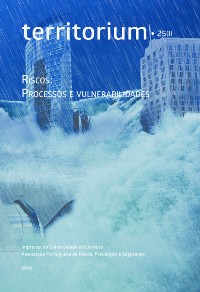Please use this identifier to cite or link to this item:
https://hdl.handle.net/10316.2/94643| Title: | Vulnerabilidade das infraestruturas rodoviárias aos efeitos de nevões na transição dos distritos do Porto e de Vila Real | Other Titles: | Road infrastructures' vulnerability to the effects of snowfall between the districts of Oporto and Vila Real | Authors: | Fidalgo, Emanuel Sardo | Keywords: | Risk;vulnerability;snowfall;roads;Risco;vulnerabilidade;nevões;rodovias | Issue Date: | 2018 | Publisher: | Imprensa da Universidade de Coimbra | Abstract: | Os episódios de neve que ocorrem no alinhamento montanhoso Marão - Alvão condicionam frequentemente o tráfego
rodoviário nas ligações entre os distritos do Porto e Vila Real. A frequência deste fenómeno no inverno realça a
vulnerabilidade das vias a cotas mais elevadas, nomeadamente o IP4 e as N15 e N101, com impactes diretos na
mobilidade de pessoas e mercadorias e consequentemente, na economia regional, nomeadamente dos distritos do
Porto e de Vila Real, sem que exista um plano de contingência integrado com vias alternativas que assegurem as
ligações rodoviárias.
A partir da identificação dos constrangimentos provocados pela neve pretende-se quantificar o impacto direto na
circulação rodoviária e perspectivar o fenómeno nas dimensões de recorrência e severidade permitindo a produção
de possíveis soluções. Estas passam essencialmente por medidas de índole estrutural ao nível da prevenção como a
interligação dos diferentes planos de emergência (distrital; municipal; especial), o que nem sempre se observa e
que se verifica como um constrangimento nas operações de salvamento/desimpedimento das vias, mas também a
identificação de vias alternativas a cotas inferiores menos susceptíveis à precipitação de neve. Snowfall episodes in the Marão - Alvão mountain range often affect road traffic between the districts of Oporto and Vila Real. The frequency of this phenomenon in the winter highlights the vulnerability of roads to higher elevations, namely the IP4 and the N15 and N101, with direct impact on the mobility of people and goods and hence the regional economy of the district of Oporto and Vila Real, without an integrated contingency plan of alternative routes to ensure road links. From the identification of the constraints caused by the snow it is intended to quantify the direct impact on road circulation and to view the phenomenon in terms of recurrence and severity allowing possible solutions to be presented. These are essentially measures of a structural nature in terms of prevention, such as the interconnection of the different contingency plans (district, municipal, special), which is not always observed and is seen as a constraint in rescue / road reopening operations, and also the identification of alternative routes to lower levels less prone to snowfall. |
URI: | https://hdl.handle.net/10316.2/43271 | ISSN: | 1647-7723 (digital) 0872-8941 |
DOI: | 10.14195/1647-7723_25-1_4 | Rights: | open access |
| Appears in Collections: | Territorium |
Files in This Item:
| File | Description | Size | Format | |
|---|---|---|---|---|
| vulnerabilidade_das_infraestruturas_rodoviarias.pdf | 5.52 MB | Adobe PDF |  |
Items in DSpace are protected by copyright, with all rights reserved, unless otherwise indicated.
